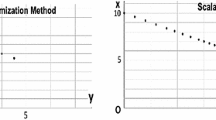Abstract
A transit equilibrium assignment problem assigns the passenger flows on to a congested transit (public transportation) network with asymmetric cost functions and a fixed origin-destination matrix. This problem which may be formulated in the space of hyperpath flows, is transformed into an equivalent problem in the space of total arc flows and an auxiliary variable. A simplicial decomposition algorithm is developed and its convergence is proved under the usual assumptions on the cost functions. The algorithm requires relatively little memory and its efficiency is demonstrated with computational results.
Similar content being viewed by others
References
D.P. Bertsekas and E.M. Gafni, Projection methods for variational inequalities with application to the traffic assignment problem, Math. Progr. Study 17 (1982) 139–159.
S. Dafermos, Traffic equilibrium and variational inequalities, Transp. Sci. 14 (1980) 42–54.
J. De Cea and E. Fernández, Transit assignment to minimal routes: an efficient new algorithm, Traffic Engineering Control 30 (1989) 491–494.
J. De Cea and E. Fernández, Equilibrium assignment on congested transit network, Publication 584, CRT, Université de Montréal (1988).
J.-P. Dussault, J.A. Ferland and B. Lemaire, Convex quadratic programming with one constraint and bounded variable, Math. Progr. 36 (1986) 90–104.
M. Florian and H. Spiess, The convergence of diagonalization algorithms for asymmetric network equilibrium problems, Transp. Res. B 16B (1982) 447–483.
M. Gendreau, Etude approfondée d'un model d'équilibre pour l'affectation des passagers dans les réseaux de transport en commun, Publication 384, CRT, Univerité de Montréal (1984).
M. Held, P. Wolfe and H.P. Crowder, Validation of subgradient optimization, Math. Progr. 6 (1974) 62–88.
J.L. Kennington,Algorithms for Network Programming (Wiley, 1980).
S. Lawphongpanich and D.W. Hearn, Simplicial decomposition of the asymmetric traffic assignment problem, Transp. Res. B 18 B (1984) 123–133.
S. Nguyen and S. Pallottino, Equilibrium traffic assignment for large transit networks, Publication 494, CRT, Université de Montréal (1985).
S. Nguyen and S. Pallottino, Hyperpaths and shortest hyperpath, Quadero no. 19 (1986).
J.S. Pang and D. Chan, Iterative methods for variational and complementary problem, Math. Progr. 24 (1982) 284–313.
J.S. Pang and C.S. Yu, Linearized simplicial decomposition methods for computing traffic equilibria on networks, Networks 14 (1984) 427–438.
H. Spiess, Contributions à la théorie et aux outils de planification des réseaux de transport urbain, Publication 382, CRT, Université de Montréal (1984).
H. Spies and M. Florian, Optimal strategies: A new assignment model for transit network, Transp. Res. B 23 B (1989).
J.G. Wardrop, Some theoretical aspects of road traffic research, Proc. Inst. Civil Eng., Part II (1952) 325–378.
J.H. Wu, M. Florian and P. Marcotte, Transit equilibrium assignment: a model and solution algorithm, Publication 721, CRT, Université de Montréal (1991).
Author information
Authors and Affiliations
Rights and permissions
About this article
Cite this article
Wu, J.H., Florian, M. A simplicial decomposition method for the transit equilibrium assignment problem. Ann Oper Res 44, 243–260 (1993). https://doi.org/10.1007/BF02072641
Issue Date:
DOI: https://doi.org/10.1007/BF02072641




